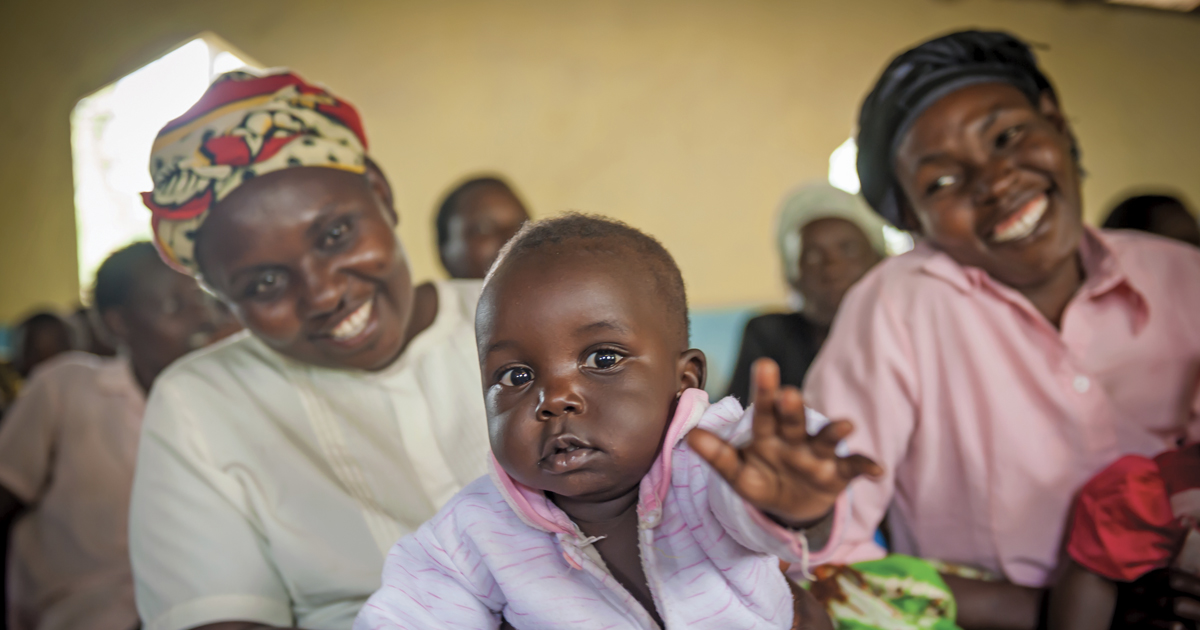To describe my mother would be to write about a hurricane in its perfect power. Or the climbing, falling colours of a rainbow.—Maya Angelou
Becoming a mother can be one of life’s greatest joys, yet it can also be a challenging journey. Bringing life into this world and nurturing the next generation is a lifelong task that takes an endless supply of support, constant learning, resources and tools.
But what happens when you’re living in a remote village with limited access to health care or health facilities? What happens when you don’t have the means to afford newborn or toddler essentials? What happens when you lack the educational resources to know how to raise a healthy, growing baby?
With almost 99 percent of maternal deaths occurring in developing countries, this is the reality for countless families living in the Global South. That’s why The Salvation Army in Canada and Bermuda focuses on maternal and child health as a key priority in our international work.
Today, sub-Saharan African countries suffer from some of the highest rates of maternal and child mortality in the world. Along with our colleagues in the Kenya West Territory and Health Partners International of Canada (HPIC), we’re aiming to improve family health across several rural communities in Kenya.
“One of the major goals for this project is to empower communities and help them become self-reliant,” says Major Hudson Mouhaliar, project officer in the Kenya West Territory. “This begins by helping women become healthy and economically empowered, and by giving them the tools to educate their children for a brighter future.”
Through the integrated mother and child health project, The Salvation Army is achieving this goal by implementing health, agriculture and livelihood development activities across western Kenya, which includes the communities of Kolanya, Cheptais and Sirisia.
In partnership with HPIC, we’re working to deliver multiple shipments of mother and child health kits, which include over-the-counter medicine and prenatal vitamins, blankets, clothing and shampoos, along with medical equipment for health clinics, including stethoscopes, scales and thermometers.
And with sustainability being the backbone of every project we implement, The Salvation Army also facilitates community health workers’ training and learning workshops, which provide mothers with the opportunity to learn about baby-care concerns ranging from how to bathe a baby to best practices for breastfeeding.
Gladys is a mother of four, who currently participates in our maternal and child health program activities.
“When I gave birth to my fourth baby, I was gifted baby blankets, medicine, clothes, socks, shampoo and mosquito nets,” she says. “The mosquito net and clothes have protected my baby from getting sick.”
Through this project, she has also learned about the importance of prenatal and postpartum care, including the danger signs in pregnancies, how to use certain supplements and vitamins safely, and common health concerns for babies.
Gladys is now able to advocate for safe and healthy pregnancies in her own community and can spread awareness to other new mothers.
With more than 5,000 community members across Kenya participating in this project, the impact will be multiplied, as each member will be able to champion safe health practices to their friends, family and community members.
Along with health tools and resources, this project also incorporates conservation agriculture training to improve nutritional health in households and seeks to build water boreholes across western Kenya.
“This project is built on partnership; we know we are stronger together,” says Lt-Colonel Brenda Murray, director of international development. “We are grateful for HPIC and our colleagues in Kenya for their support in bringing health and hope to those who need it most.”
They say it takes a village to raise a child. For many around the world, it also takes an Army. If you’d like to support this life-saving project, please visit salvationarmy.ca/giftsofhope and give to “Family Health” today.
Kathy Nguyen is the resource/media co-ordinator in the international development department.
Photo: Joel Johnson
This story is from:










Leave a Comment